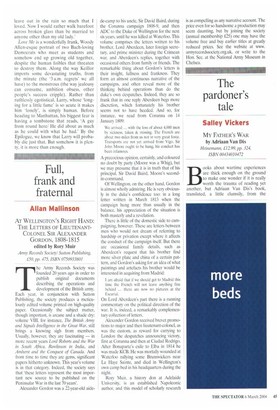Full, frank and fraternal
Allan Mallinson
AT WELLINGTON'S RIGHT HAND: THE LE'l l'ERS OF LIEUTENANTCOLONEL SIR ALEXANDER GORDON, 1808-1815 edited by Rory Muir Army Records Society! Sutton Publishing, £50, pp. 475, ISBN 0750933801 The Army Records Society was founded 20 years ago in order to publish original documents describing the operations and development of the British army. Each year, in conjunction with Sutton Publishing, the society produces a meticulously edited volume printed on high-quality paper. Occasionally the subject matter, though important, is arcane and a shade dry: volume VIII, for instance, The British Army and Signals Intelligence in the Great War, still brings a knowing sigh from members. Usually, however, they are fascinating — in more recent years Lord Roberts and the War in South Africa, Rawlinson in India, and Amherst and the Conquest of Canada. And from time to time they are gems, significant papers hitherto unknown. This year's volume is in that category. Indeed, the society says that 'these letters represent the most important new source to be published on the Peninsular War in the last 70 years'.
Alexander Gordon was a 22-year-olci aide
de-camp to his uncle, Sir David Baird, during the Corunna campaign 1808-9, and then ADC to the Duke of Wellington for the next six years, until he was killed at Waterloo. This volume comprises the letters written to his brother, Lord Aberdeen, later foreign secretary, and prime minister during the Crimean war, and Aberdeen's replies, together with occasional others from family or friends. The remarkable thing about Gordon's letters is their insight, fullness and frankness. They form an almost continuous narrative of the campaigns, and often reveal more of the thinking behind operations than do the duke's own despatches. Indeed, they are so frank that in one reply Aberdeen begs more discretion, which fortunately his brother seems not to have heeded. And so, for instance, we read from Corunna on 14 January 1809:
We arrived ... with the toss of about 4,000 men by sickness. taken & missing. The French are about two miles from us not in very great force. Transports are not yet arrived from Vigo. Sir John Moore ought to be hung, his conduct has been infamous.
A precocious opinion, certainly, and coloured no doubt by party (Moore was a Whig), but we may presume that it is in truth that of his principal. Sir David Baird, Moore's secondin-command.
Of Wellington, on the other hand, Gordon is almost wholly admiring. He is very obviously in the duke's confidence too: in a long letter written in March 1813 when the campaign hung more than usually in the balance, his appreciation of the situation is both masterly and a revelation.
There is little of the domestic side to campaigning, however. These are letters between men who would not dream of referring to hardship or privation except where it affects the conduct of the campaign itself. But there are occasional family details, such as Aberdeen's request that his brother find more silver plate and china of a certain pattern, and Gordon's asking for an idea of what paintings and artefacts his brother would be interested in acquiring from Madrid:
I am afraid that if we should get to Madrid this time the French will not leave anything fine
behind there are now no pictures at the Escurial.
On Lord Aberdeen's part there is a running commentary on the political direction of the war. It is, indeed, a remarkably complementary collection of letters.
Alexander Gordon received brevet promotions to major and then lieutenant-colonel, as was the custom, as reward for carrying to London the despatches announcing victory, first at Corunna and then at Ciudad Rodrigo. After Bonaparte's exile to Elba in 1814 he was made KCB. He was mortally wounded at Waterloo rallying some Brunswickers near La Have Sainte, and died in Wellington's own camp bed in his headquarters during the night.
Rory Muir, a history don at Adelaide University, is an established Napoleonic author, and this model of scholarly research is as compelling as any narrative account. The price even for so handsome a production may seem daunting, but by joining the society (annual membership £25) one may have the volume free and buy earlier titles at greatly reduced prices. See the website at www. armyrecordssociety.org.uk, or write to the Hon. Sec. at the National Army Museum in Chelsea.


















































































 Previous page
Previous page